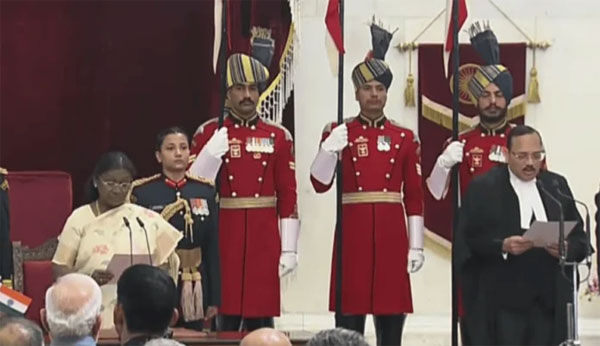Daijiworld Media Network - New Delhi
New Delhi, Nov 24: President Droupadi Murmu on Monday administered the oath of office to Justice Surya Kant, formally appointing him as the 53rd Chief Justice of India (CJI). He will serve a 14-month tenure, demitting office on February 9, 2027.
Justice Kant succeeds Justice Bhushan R. Gavai, who retired on Sunday upon attaining the age of 65. Following established convention, Justice Gavai had recommended Justice Kant—the senior-most judge of the Supreme Court—as his successor. The President appointed him under Article 124(2) of the Constitution.

Distinguished Legal Career
Born on February 10, 1962, in Haryana, Justice Surya Kant began his legal practice in Hisar in 1984 before shifting to Chandigarh to practise before the Punjab and Haryana High Court. Over the years, he represented a wide range of institutions—including universities, banks, Boards and corporations—and was appointed Advocate General of Haryana in 2000, becoming the youngest to hold the post.
He was designated a senior advocate in 2001, and in 2004, elevated as a permanent judge of the Punjab and Haryana High Court. Justice Kant later served as Chief Justice of the Himachal Pradesh High Court from October 2018 until his elevation to the Supreme Court on May 24, 2019.
Since November 2024, he has been Chairperson of the Supreme Court Legal Services Committee, and previously served twice on the governing body of NALSA.
Priorities as CJI
Speaking ahead of assuming charge, Justice Kant said that reducing case pendency across courts would be his top priority. He plans to work closely with High Courts to identify systemic bottlenecks in district and subordinate courts.
He also announced that five-, seven- and nine-judge Constitution Benches would be set up “in the next few weeks” to hear long-pending constitutional matters.
Justice Kant stressed the need to expand alternative dispute resolution, especially mediation:
“Mediation will be implemented effectively to reduce the burden of millions of cases,” he said, adding that community mediation must be encouraged to ease inter-state and Centre–state disputes.
On the Use of AI in Judiciary
Asked about integrating AI into judicial functioning, the new CJI said it may assist in procedural matters, but cautioned that litigants expect human adjudication.
“AI has advantages, but there are concerns too. Everyone wants their case to be decided by a judge,” he noted.
The Centre had earlier cleared Justice Kant’s appointment on October 30.